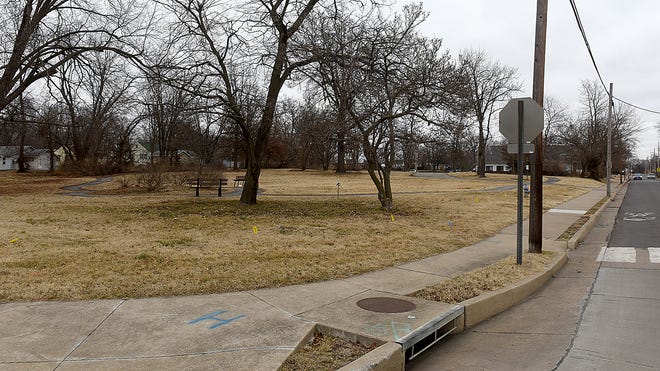The Columbia Housing Authority announced last week that the $3 million in low-income housing tax credits it recently received from the Missouri Housing Development Commission fills the gap on funding for Kinney Point, an affordable housing development at the northeast corner of Garth Avenue and Sexton Road.
Groundbreaking on construction is estimated to happen by May, said Randy Cole, housing authority CEO.
“We still need to bid out all the work. That will come early next year,” Cole said.
Additional funding for Kinney Point comes from the $1 million already raised by CHA, a $1.3 million grant from the Veterans United Foundation and $2 million in HOME-American Rescue Plan funds from the City of Columbia.
More:Kinney Point will bring a 24-unit affordable housing complex near Garth and Sexton in Columbia
Excitement levels were high Sept. 23 when the state commission made the award. This was also the day CHA had to submit its tax credit application for its next project: rebuilding Park Avenue housing units.
“There is just a big need for affordable housing. We’re seeing an increase in demand in our offices and that’s the role we play in the community,” Cole said.
“We are excited to be able to meet the need more.”
Increasing the housing authority stock will help the organization address its 1,200-household wait list. Kinney Point will feature 24 units — 10 with four bedrooms, eight with three bedrooms and six with two bedrooms. Kinney Point is part of the housing authority’s five-year plan of expansion and improvements to its affordable housing stock.
Those who connect with CHA “are experiencing some form of homelessness or housing instability,” Cole said.
This can include being doubled up with a family member or a friend in an unstable housing situation, he added.
A request to reduce the size of parking lot from 68 to 40 spots at Kinney Point was approved July 18 by the Columbia City Council through its consent agenda.
“There was a strong desire from the neighborhood to have a reduction in parking to help us save a couple additional existing trees,” Cole said. “We looked at parking used per household in our current housing and a reduction we felt would meet the need for parking there as well.”
Overflow parking is available when necessary at neighboring Oak Towers.
On average, 25% of households eligible for publicly assisted housing are unable to access programs and services, due to the gap between needs and available resources, CHA said in its announcement last week.
Construction of Kinney Point will aid CHA as it works toward the Park Avenue project. The organization expects to hear about its tax credit application for this next project Dec. 9 from the state commission. These tax credits will be the final funding source, much like with Kinney Point, Cole said.
“There would still need to be the similar due diligence period of bidding, closing and all the financing. We would think we would close financing on the project in late 2023,” he said.
Construction on Kinney Point likely would finish before CHA would start on Park Avenue, Cole added. This gives some housing flexibility to CHA.
Park Avenue residents could temporarily relocate to Kinney Point while Park Avenue housing is demolished and rebuilt, Cole said. Once Park Avenue construction is finished, residents could move back. Construction for the Park Avenue project is estimated to finish by mid-summer 2024.
More:Unsheltered Opportunity Campus could go on Business Loop after replat of land
The Park Avenue project is estimated to cost $22 million and has received support from the city council and the Boone County Commission. Local government support bolsters tax credit applications with the state, said Nancy Thompson, Columbia city attorney, last month.
The city also committed to providing $2 million in American Rescue Plan Funds toward the Park Avenue project.
CHA next will seek low-income housing tax credits in September 2023 for a major reconstruction of the Providence Walkway Apartments. This project could finish by mid-summer 2025 if funding applications are successful.
Charles Dunlap covers local government, community stories and other general subjects for the Tribune. You can reach him at cdunlap@columbiatribune.com or @CD_CDT on Twitter. Subscribe to support vital local journalism.

